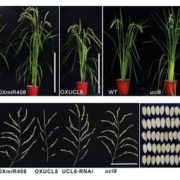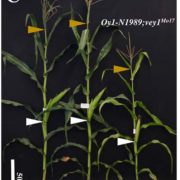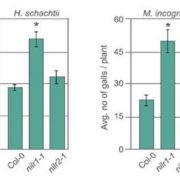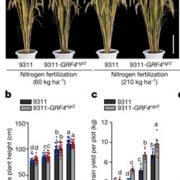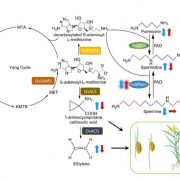ABC transporter-mediated transport of glutathione conjugates enhances seed yield and quality in chickpea (Plant Physiol)
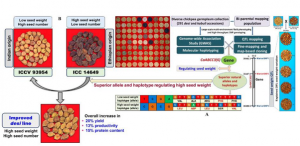 Identifying the genetic determinants of yield and quality traits is essential for crop improvement. Chickpea is the third-most cultivated legume species and is a prominent source of protein to global consumers. Genetic improvement of chickpea, in terms of enhancing its seed size and weight, has been impeded as the QTLs and genes identified so far are not robust enough to regulate these traits across diverse genetic backgrounds and environments. In this new work, Basu et al. have deployed an integrated approach of molecular genetics, functional genomics and genomics-assisted breeding to identify an ABCC3-type ATP binding cassette (ABC) transporter gene that regulates seed size as well as weight in chickpea. An association panel consisting of 291 diverse chickpea accessions representing both desi (189) and kabuli (102) cultivar groups were phenotyped for pod number, seed number and weight traits for three consecutive years. Genome-wide association mapping revealed an association of a synonymous SNP in ABCC3(6) with seed weight; furthermore, introgressing ABCC3(6) in near-isogenic lines (NILs) improved seed weight. Further analysis showed that ABCC3(6) modulates glutathione conjugate transport to enhance seed weight. (Summary by Muthamilarasan Mehanathan) Plant Physiol. 10.1104/pp.18.00934
Identifying the genetic determinants of yield and quality traits is essential for crop improvement. Chickpea is the third-most cultivated legume species and is a prominent source of protein to global consumers. Genetic improvement of chickpea, in terms of enhancing its seed size and weight, has been impeded as the QTLs and genes identified so far are not robust enough to regulate these traits across diverse genetic backgrounds and environments. In this new work, Basu et al. have deployed an integrated approach of molecular genetics, functional genomics and genomics-assisted breeding to identify an ABCC3-type ATP binding cassette (ABC) transporter gene that regulates seed size as well as weight in chickpea. An association panel consisting of 291 diverse chickpea accessions representing both desi (189) and kabuli (102) cultivar groups were phenotyped for pod number, seed number and weight traits for three consecutive years. Genome-wide association mapping revealed an association of a synonymous SNP in ABCC3(6) with seed weight; furthermore, introgressing ABCC3(6) in near-isogenic lines (NILs) improved seed weight. Further analysis showed that ABCC3(6) modulates glutathione conjugate transport to enhance seed weight. (Summary by Muthamilarasan Mehanathan) Plant Physiol. 10.1104/pp.18.00934


